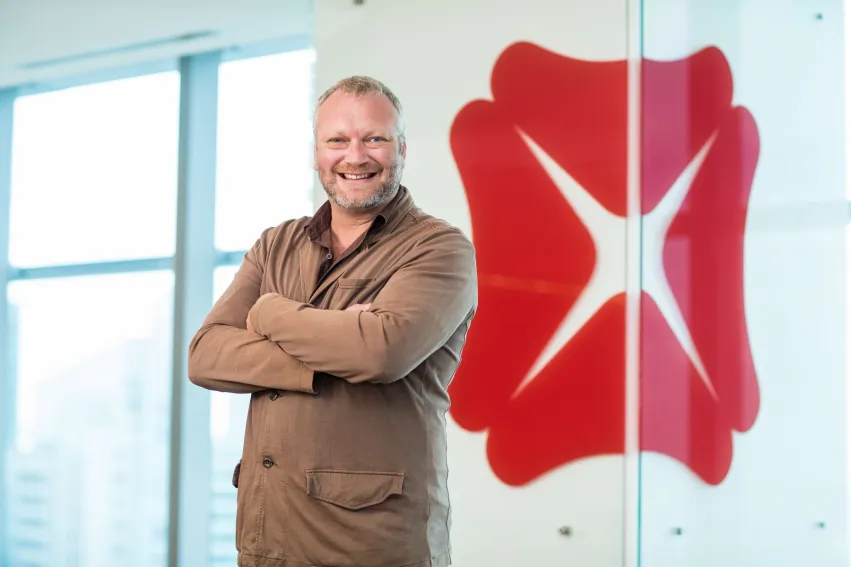
DBS CIO Neal Cross reveals three key branch banking strategies for the future
He also talks of plans of creating a digitised banking sphere for consumers.
As managing director and chief innovation officer at DBS Bank, Neal Cross is in charge of driving the bank’s innovation agenda regionally. With over 20 years of experience in technology, innovation and financial services to back him up, Cross charts the innovation roadmap for DBS to enhance customer experience and better engage the bank’s customers in the digital landscape.
He also talks of plans of creating a digitised banking sphere for consumers.
He also talks of plans of creating a digitised banking sphere for consumers.
As managing director and chief innovation officer at DBS Bank, Neal Cross is in charge of driving the bank's innovation agenda regionally. With over 20 years of experience in technology, innovation and financial services to back him up, Cross charts the innovation roadmap for DBS to enhance customer experience and better engage the bank's customers in the digital landscape.
He also talks of plans of creating a digitised banking sphere for consumers.
As managing director and chief innovation officer at DBS Bank, Neal Cross is in charge of driving the bank's innovation agenda regionally. With over 20 years of experience in technology, innovation and financial services to back him up, Cross charts the innovation roadmap for DBS to enhance customer experience and better engage the bank's customers in the digital landscape.
In an exclusive interview with Asian Banking and Finance, Cross talks about DBS' digitisation efforts and how he envisages the retail bank branch of the future.
ABF: Why is digitisation/innovation important for DBS?
The pursuit of digitisation and innovation at DBS is focussed clearly on one thing, to be able to improve the kind of experiences we provide for our customers that enable them to live more. However, the manifestation of that pursuit are two very distinct things.
For us, digitisation is a recognition of where society is headed towards, with the increasing use of digital technologies. It's clear that consumers are moving towards more digital experiences as they have access to various devices that allow them to seamlessly access various services. At the end of the day, it's all about convenience and that's why digitisation is important to us, because it is pivotal in transforming banking experiences to become effortless and simplified.
DBS's Digibank is a prime example of this as we wanted to redesign the consumer experience of banking, where customers can do all their banking virtually.
Innovation though represents a different frontier where our big focus is on innovation management. To us, innovation is a mindset, it's really not about technology. And that mindset needs to be an inclusive one, which means everyone within the bank should be able to innovate.
At its heart, innovation management is about using a set of tools that enables people within DBS to have a common understanding of processes and goals – that is our focus on customer centricity. Having that understanding empowers our people to think outside the box and respond to external and internal circumstances and use creativity to introduce new ideas, processes and products to address current needs.
That's why our focus has always been to get our people to envision and work towards creating how they want the future to look like. We then get them to make continuous improvements, incremental steps to help us get to the future. That's the way forward for DBS, to train everyone at our organisation to become problem solvers and innovators. Working in that direction ensures that our organisation continues to remain relevant and able to offer our customers value.
ABF: You've won multiple accolades for your digitisation efforts recently. What is your digital banking strategy in Asia?
It's always very reassuring, and encouraging at the same time, to be awarded and recognised by such renowned personalities, who in themselves are highly symbolic to innovation – Steve Wozianak, Sir Richard Branson and the likes (We were also just recognised as the World's Best Digital Bank).
To put it simply, our digital banking strategy has always focussed on the end-users, our customers. We started to envisage what their future would look like and how digital technology plays a role in that. That's why we are in the midst of creating a digitised banking sphere for our consumers using sophisticated systems architecture in our backend technology, which by the way is already driving 99% of its interactions with its consumers. Through the use of API's we have been able to turn banking into an experience, rather a transaction for our customer. Integration is key here. We have and will continue to ensure that process flows are designed to seamless integrate with consumers' everyday lives.
And this is also where partnerships come in. Partnerships are essential to how we transform these experiences by bringing in alternative perspectives and value to enhance our offering.
Proprietary partnerships have been a core part of this digital strategy because we know that we cannot go at it alone, but collaboration has the power to create astounding outcomes. And this is why we've built up partnerships with established technology companies, as well as engaged with the startup and fintech community.
ABF: How do you picture the retail bank branch of the future? What do you think will be the trends given the big push for digitisation and innovation across the region?
Too many banks have been focussed on trying to integrate technology into their retail branches without truly trying to understand what customers want from a retail branch. Branches should be a place where customers feel like they can spend time as opposed to a place that frustrates them.
There will come a time when we see more people coming to the branch for advice as they conduct their transactions online or via mobile. That means redesigning the branch to suit that experience and then identifying how technology plays into that rather than force feeding technology into the branches as is often done now. That has several implications on the way banks operate in the future.
For one, the push towards digitisation and innovation means that banks will need to substantiate their own employee journeys, so their people are ready for the new kinds of customer experiences consumers desire. That means we will see a lot of retraining of staff as organisations seek to improve employee productivity and raise satisfaction levels (both from their customers and their own employees).
Secondly, we might see the redesign of branches that aim to maximise spaces for interactions as opposed to a usual scene in a branch where we see customers often waiting around. DBS has already introduced SMS queue systems so customers don't waste their time. What we may see is the increasing growth of digital spaces where banks may primarily operate to engage with customers.
Thirdly, from an organisational standpoint, the shift towards digitisation is accelerating the movement towards design for no ops, where more and more processes are being automated and operations staff can evolve technical orientations to focus on business related responsibilities. This means organisations will start to become leaner, more productive and over time, produce better outcomes and results.
The success of Digibank in India is a statement in itself that the future of consumer banking is breaking the barriers of physical and heading towards the virtual. Which effectively means that people wouldn't have to travel to our banks; instead we bring banking right onto their palms.
Any further visible distance between a banking institution and the consumer will be eliminated. The future is yet to unveil a new face of banking. All this will be made possible with increasing number of tie-ups or cooperation between smaller fintech start-ups and larger financial institutions.
On the whole structured automation not only speeds up the process, but it also reinstates what we believe in – and that in itself is making banking more simplified for our customers and enabling them to live more.
As far as the push is concerned, it's already surpassed the region, the push for digitisation is pretty much global, especially with the world shrinking at its current pace.
ABF: How do you work with fintechs?
We've been engaging with fintech and start-ups organisations through various partnership programmes to explore how we can partner with them on new initiatives.
Last year, we organised DBS HotSpot, a pre-accelerator incubation programme to help early stage start-ups to get their idea off the ground. We provided them seed money without requiring equity from them, working spaces as well as giving them access to leading entrepreneurs to guide and mentor them. Not all the companies in HotSpot are fintech though, because we also believe in gaining alternative perspectives and learning from other industries on how we can create better services and products for our customers.
The goal really of working with fintech is to learn from the innovation of smaller, faster and nimbler players and take that learning into the bank, or create win-win partnerships that will improve the entire banking community. Banks can just choose to sit back, let fintech disrupt the market and get taken over, or collaborate with them, learn from other innovators and start creating the disruption themselves. That's what we're trying to do at DBS.
We've also been running our Fintech Assessments programme. The goal of the programme is to match fintechs with business units within DBS. We've put together a team of researchers who work with our business units to understand their various challenges and then we identify which fintechs exist which might offer a solution to address these challenges. It's a full time effort with our analysts constantly on the lookout for emerging fintech companies and engaging with them to evaluate how we can create new value.
Earlier this year, DBS also announced cross referral partnerships with the P2P platforms, Funding Societies and Moolahsense to provide financial access to companies the bank cannot lend to (due to regulatory restrictions). It's part of our commitment to creating new partnerships but also offering value to customers and we see the value that these platforms can provide.
ABF: What is your vision for the bank in terms of innovation?
To reinvent the future of banking. That means making innovation an ingrained mindset throughout the bank, something that is inclusive. After all, everyone has the ability and capacity for innovation no matter what role they play in DBS.
One thing we've done is to organise sessions that expose our people to inspirational stories of innovation. We started the Imaginarium talks, monthly dialogues that bring innovators from around the world to share about their own stories. The goal is to expose our people to different ideas and perspectives, and get them to start thinking how else they can apply those kinds of learning and thinking in their everyday jobs.
We've also been running several workshops to help people on their innovation journey, providing them tools, approaches and developing their mindsets to make banking easier for the bank's customers.
We're also encouraging more people within DBS to start their own entrepreneurship projects. As part of DBS HotSpot, our incubation programme for early stage start-ups, we've selected some promising DBS staff who have a passion and an idea to create their own business, given them time off from work, and housed them with other entrepreneurs. Exposing them to different ways of work outside the bank, how entrepreneurs are working will help open up their minds and grant them new perspectives.
And finally, we are solidifying our focus towards innovation by launching our new innovation facility sometime end of this year. It has become a core focus area across all levels of the hierarchy. The new facility will drive the re-imagination of the individual, the work, the consumer and eventually, the future of banking.
ABF: What are your key business philosophies?
“Everyone gets fed” – recognise and reward those who work with you, inside or outside of your organisation.
“Create a safe place to fail” – Encourage a culture of experimentation
“Have the right intent” – operate in a way that is fair and transparent
Give your team protection, education, inspiration and freedom.
ABF: What do you consider as your biggest achievements so far as DBS CIO?
Building and motivating a world class team of passionate innovators who will form the next generation of innovation leaders in Asia.
ABF: What three goals are you focussed on in the next 12 months?
This year, DBS has embarked on one of our largest projects called Iconic Journeys, initiatives which will deliver a significant shift in how customers interact with the bank. We're focussed on making sure the DBS Innovation Group (DiG) is supporting the bank in this endeavour, to show the benefits of using human-centred design, experimentation and Agile to ensure the success of Iconic Journeys.
We are also expanding our innovation footprint to Hong Kong and India so we need to learn how we can effectively regionalise our programmes to get even more staff and partners involved in the business of innovation.


















 Advertise
Advertise







